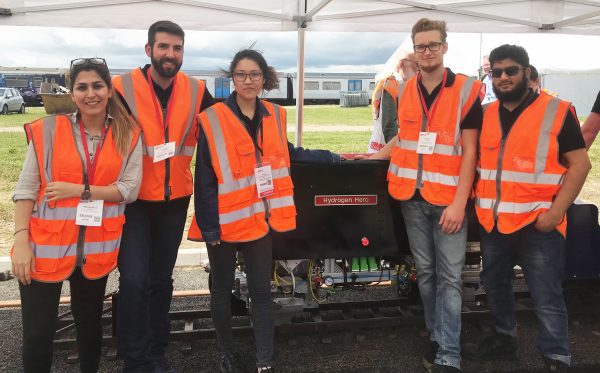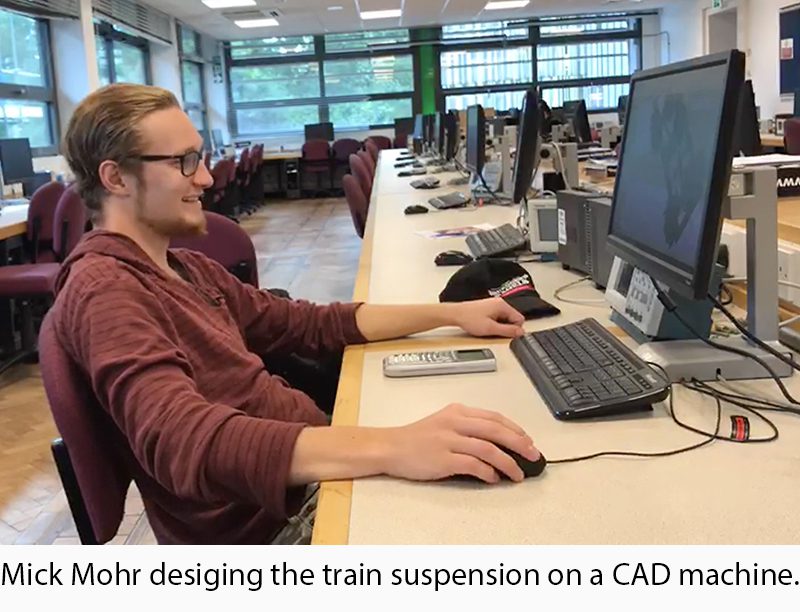49er Engineers Take Part in UK Railway Challenge

Building and operating a 1/8-scale hydrogen-powered locomotive named the ‘Hydrogen Hero’, a team of engineering students from UNC Charlotte and the University of Birmingham, England, were the top student team and third-place team overall at the Institute of Mechanical Engineers Railway Challenge held in Leicestershire, England, in July.
Recent Mechanical Engineering graduates Noah Weiss and Mick Mohr joined the team in England, as it prepared for the seventh annual IMechE Railway Challenge. For the competition, trains went through track-based challenges demonstrating elements such as energy storage, traction, ride comfort and noise. Then during a presentation challenge, the students were tested on the design, business case and innovation.
“Mick and I graduated on May 12th, and left for England the Monday after that,” Weiss said. “We were there for seven weeks, working every weekday from 8 to 5. And we worked really hard.”
The two new UNC Charlotte graduates had recent experience with trains, having just completed their year-long senior design project, a wireless power transformer (WPT) for charging train batteries. The project, called ‘Railwire’, used WPT in fixed guideway applications to eliminate the need for alignment between power transmitters and receivers.

“I’m a mechanical engineer, but I worked side-by-side with our electrical engineering team member on the project,” Weiss said. “That was incredibly valuable for the work I did in England. We had a number of electrical issues and I was able to step right into a problem, analyze it and solve it.”
The England project included designing the entire drive system and power plant for a locomotive. The team was judged on engineering elements including, cost, maintainability and reliability.
“There was also a judging category for innovation in the propulsion system,” Weiss said. “Our innovation was using a hydrogen fuel cell, in conjunction with a large DC-to-AC converter to drive the electric motor.”
The use of hydrogen earned the train its name, the ‘Hydrogen Hero’. As the UK’s first fully operating hydrogen train, the team first unveiled the locomotive at Rail Live 2018, an annual event that brings the UK rail industry together to showcase new innovation.
“We had the Rail Live demonstration at Stratford-Upon-Avon two weeks before the July 2 IMechE competition,” Weiss said. “We got there on a Friday and the train was not working. We discovered that a surface mount fuse had blown in the controller. We took it back to the power lab at Birmingham, got the part fixed and we were running by Saturday. The whole project involved a lot of trouble shooting. They were simple problems like electrical connections or blown fuses, but they took time to analyze and fix.”
Working with the University of Birmingham’s Center for Railway Research and Education (BCRRE) was a great opportunity, Weiss said. “Train research is a big deal at Birmingham. There is a lot of train research going on in the UK related to reducing greenhouse gases.”
Transportation accounts for a quarter of the UK’s greenhouse gas emissions and the government has committed reducing carbon emissions by at least 80 percent, against 1990 levels, by 2050. In February 2018, the Ministry of State for Transport called for diesel trains to be phased out by 2040. Hydrogen trains are expected to form a key part of the UK’s plan to tackle climate change and to improve air quality.

For the IMechE Challenge in Leicestershire, the Hydrogen Hero pulled passenger cars with 20 to 30 passengers along a track that ran through the country side, going past lakes, fields and grazing sheep. The locomotive and the team both performed well at the Challenge, placing third overall and first for university teams.
“The experience taught me a lot about culture and doing a project with a diverse group of people,” Weiss said. “It was a great way to apply what I learned during my senior design project.”
Having never been to Europe before, the experience gave Weiss and Mohr the chance to visit other countries including Spain and Holland for long weekends.
“I got a really awesome European trip out of this opportunity,” Weiss said. “Living in a small English town, riding bikes everywhere and not driving a car for seven weeks was so different from anything I’d ever experienced. It was great to see a different walk of life. They have a different pace and different priorities there. A lot of their social activities revolve around drinking beer at pubs in the evenings, which was okay with me and Mick.”
The team would like to thank the Mooresville Rotary Club, Mooresville Chamber of Commerce and other individuals in Mooresville for their support in helping with travel expenses this year and in the past.